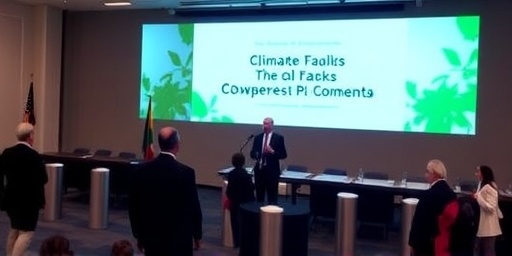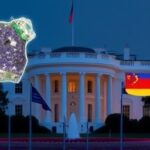In a stunning development at the ongoing United Nations Climate change Conference (COP) in Belém, Brazil, the United States has notably absented itself from key negotiations, handing the reins to petro-states and fossil fuel-reliant emerging economies. This void has allowed nations heavily dependent on oil, gas, and coal to steer discussions toward outcomes that prioritize gradual transitions over immediate, aggressive action on Climate change. As delegates from over 190 countries converge on the Amazonian city, the fractured global response underscores deepening rifts in international policy, particularly around the role of fossil fuels in a warming world.
The COP negotiations, meant to build on previous commitments like the Paris Agreement, have taken a pivotal turn without American participation. Sources close to the talks reveal that U.S. diplomats cited domestic political gridlock and shifting priorities under the current administration as reasons for the boycott. This marks a rare instance where the world’s largest historical emitter of greenhouse gases has opted out entirely, leaving European allies scrambling and opening the door for oil-rich Gulf states and coal-dependent powerhouses like India and Indonesia to amplify their voices.
Petro-States Secure Loopholes in Emission Reduction Targets
At the heart of the Belém summit’s tensions are the proposed updates to Nationally Determined Contributions (NDCs), the voluntary pledges countries make to curb emissions. Without U.S. pressure for stringent targets, petro-states such as Saudi Arabia and Russia have successfully lobbied for flexible timelines that accommodate their fossil fuels economies. A draft text circulating among delegates, obtained by environmental watchdogs, includes clauses allowing ‘phasedown’ language for unabated fossil fuel use rather than outright phaseouts—a concession that critics argue dilutes the urgency of Climate change mitigation.
Statistics from the International Energy Agency (IEA) paint a grim picture: global fossil fuel production must peak before 2025 to limit warming to 1.5°C, yet current projections show a 2.2% increase in 2023 alone. In Belém, representatives from OPEC nations highlighted their economic vulnerabilities, with Saudi Energy Minister Prince Abdulaziz bin Salman stating, ‘We cannot abandon our resources overnight; a just transition requires support, not ultimatums.’ This stance resonated with delegates from fossil fuel-dependent regions, leading to the adoption of interim goals that delay binding commitments until 2030.
Environmental advocates, including Greenpeace’s International Executive Director Jennifer Morgan, decried the shift: ‘The absence of the U.S. has turned this COP into a fossil fuel fest, where short-term gains trump planetary survival.’ The negotiations also touched on carbon capture technologies, with subsidies for such innovations gaining traction among oil producers as a way to greenwash continued extraction.
Emerging Economies Demand Climate Finance Amid Fossil Fuel Defenses
Brazil, as host nation under President Luiz Inácio Lula da Silva, has positioned itself as a bridge-builder, but the talks reveal stark North-South divides. Emerging economies like Brazil, India, and South Africa—many reliant on coal and oil for energy security—have used the U.S. vacuum to push for enhanced climate finance from developed nations. They argue that without trillions in funding, rapid decarbonization is impossible, especially as fossil fuels still power 80% of global energy needs, per World Bank data.
In side sessions, Indian Climate Minister Bhupender Yadav emphasized, ‘Developing countries bear the brunt of climate change impacts while contributing the least. We need equitable international policy that recognizes our right to development.’ This rhetoric secured pledges for a new loss and damage fund, though details on contributions remain vague without U.S. buy-in. The fund, established at COP27, aims to aid vulnerable nations hit by extreme weather, but fossil fuel states have tied their support to exemptions from aggressive renewable mandates.
Contextually, Belém’s location in the Amazon adds irony: deforestation linked to agribusiness and mining—often fueled by fossil fuel machinery—continues unabated. Satellite data from Brazil’s National Institute for Space Research shows a 50% rise in Amazon fires this year, exacerbating global environmental degradation. Delegates toured affected areas, yet negotiations sidestepped binding protections for indigenous lands, prioritizing economic deals.
European Union Struggles to Counter Fossil Fuel Influence Without US Ally
The European Union, traditionally a leader in COP negotiations, finds itself isolated in pushing for ambitious goals. EU Climate Commissioner Frans Timmermans lamented the U.S. absence in a plenary speech: ‘Unity is our strength; without it, we risk a world where fossil fuels dictate our future.’ Brussels has proposed a global methane pledge expansion and stricter oversight on fossil fuel subsidies, estimated at $7 trillion annually by the IMF, but these face resistance from a bloc of 40+ nations defending their energy sovereignty.
Key sticking points include the Global Stocktake, a biennial review of Paris Agreement progress. Reports indicate the world is off-track, with temperatures projected to rise 2.5-2.9°C by century’s end. In Belém, without U.S. leverage—recall its $100 billion annual climate aid promise from 2009—fossil fuel defenders watered down language on ‘tripling’ renewable energy capacity by 2030. Instead, a compromise calls for ‘doubling efforts,’ a move environmental NGOs like the World Wildlife Fund (WWF) call ‘insufficient and dangerous.’
Interviews with EU negotiators reveal frustration: one anonymous official told reporters, ‘We’re outgunned here. The U.S. pullout has emboldened those who see climate change as a threat to profits, not people.’ This dynamic highlights broader international policy failures, as G20 commitments from last year’s Delhi summit on phasing down coal remain unenforced.
Indigenous Voices and Local Impacts Amplify Calls for Urgent Reform
Beyond high-level diplomacy, grassroots movements in Belém have spotlighted the human cost of delayed action. Indigenous leaders from the Amazon, representing groups displaced by oil exploration, staged protests demanding recognition in COP negotiations. Célia Xakriabá, a prominent Brazilian indigenous activist, addressed the assembly: ‘Our forests are the lungs of the Earth, yet fossil fuels invaders destroy them daily. The U.S. absence silences our fight against environmental injustice.’
Data from the UN’s Intergovernmental Panel on Climate Change (IPCC) underscores the stakes: indigenous territories store 80% of global biodiversity, yet face disproportionate threats from extractive industries. In Brazil, Petrobras’ offshore drilling expansions have sparked legal battles, with climate change litigation rising 25% worldwide in 2023, per the Sabin Center for Climate Change Law.
These voices influenced side agreements on nature-based solutions, including a $20 billion biodiversity credit mechanism, but critics argue it’s a distraction from fossil fuel curbs. Youth activists, echoing Greta Thunberg’s global strikes, rallied outside the venue, chanting for ‘real action now,’ amplifying the generational divide in international policy.
As the Belém COP draws to a close, the outcomes signal a precarious path forward. Without U.S. re-engagement, future summits like COP29 in Azerbaijan—a major oil producer—may deepen fossil fuel entrenchment. Experts warn of cascading effects: delayed transitions could lock in $1.4 trillion in stranded assets by 2050, per BloombergNEF, while vulnerable nations face intensified floods, droughts, and displacements. Brazil’s presidency vows to carry momentum into 2024, urging bilateral deals to bridge gaps. Yet, the specter of division looms large, challenging the world to reconcile economic realities with environmental imperatives before tipping points are crossed.








